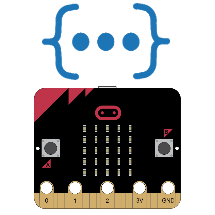
What it’s about
This short tutorial introduces dictionaries, a way of organizing data as a set of key-value pairs. Shopping and ingredient lists are examples of key-value pairs. Here’s how one might look in a MicroPython dictionary:
shopping = { ’bananas’: 3, ’bread’: 1, ’peanut butter’: 1, ’soda’: 6 }
Another example could be a Cybersecurity app where a controller micro:bit sends radio navigation commands to a micro:bit in a cyber:bot. Both micro:bit modules will run scripts that use dictionaries. So, take some time to get familiar with dictionaries now, because you’ll use them a lot later.
Before you start
You will need:
- A micro:bit module (on or off a cyber:bot)
- A USB A to MicroB cable
- A computer with Internet access to python.microbit.org
Complete this tutorial first:
After you finish
You will understand how dictionaries use key-value pairs for storing and managing data. This will help you better understand and work with the MicroPython code examples in the Cybersecurity: Radio Data and later tutorials.
After this, you will also be ready to move on to the next tutorials (with more coming soon!):
